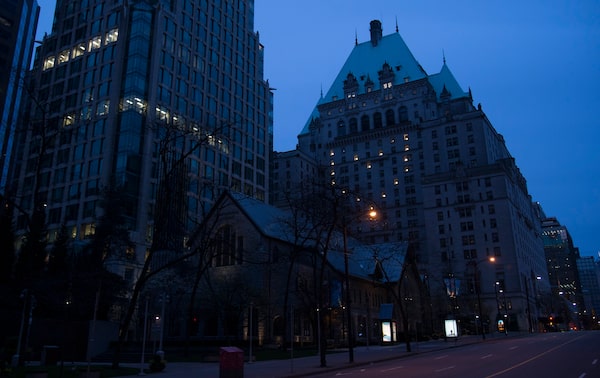
A downtown hotel has lights turned on to make the shape of a heart in Vancouver, on April 7, 2020. The hotel occupancy rate in the week of March 29 to April 4 was just 13 per cent, according to hotel research firm STR.JONATHAN HAYWARD/The Canadian Press
Canadian hotels have lost most of their business, sending revenues plunging and resulting in more than 200,000 job losses as the coronavirus pandemic halts travel.
The hotel occupancy rate in the week of March 29 to April 4 was just 13 per cent, according to hotel research firm STR. That’s a 79-per-cent decrease over the same period last year, with Quebec recording the steepest decline.
That has sent revenue per available room, a key indicator of profitability also known as RevPar, down 85 per cent to $13.42. In Quebec, where the occupancy rate was 6 per cent, revenue per available room fell 93 per cent to $6.87.
Luxury and upscale hotels have suffered the biggest losses, as demand dries up from business travellers and group bookings. The occupancy rate for luxury hotels was 2.5 per cent across Canada in the first week in April, with revenue per available room plunging 97 per cent over the previous year to $5.07.
“These are unprecedented numbers,” said Jan Freitag, a senior vice-president with STR. “The high end of the market depends disproportionately on groups and meetings and the corporate travel. Those two sources have basically evaporated,” he said.
RevPar for upper mid-scale hotels dropped 81 per cent to $14.89, while mid-scale declined 73 per cent to $16.44.
The closings and loss of revenue has resulted in widespread job losses. Nearly 300,000 jobs in accommodation and food services were eliminated in March, according to the most recent data from Statistics Canada.
The jobs are among the lowest paid positions in the labour market and no one is certain how quickly the travel industry will bounce back.
“They are the first to lose their job and probably will be the last to regain it,” said Benjamin Tal, deputy chief economist with Canadian Imperial Bank of Commerce. “Not only is their joblessness rate up, but the duration of unemployment in that sector will be much longer than in many other sectors.”
Cities that had particularly strong demand – Toronto, Vancouver and Ottawa – had a massive drop in occupancy and revenue after early March. In Toronto, the occupancy rate was 8.6 per cent in the first week in April; Vancouver was 17 per cent and Ottawa was 13 per cent.
Toronto and Montreal recorded the steepest revenue declines, falling 92 per cent from the same week last year. The RevPar in Toronto across all classes of hotels was $10.93 and in Montreal it was $7.81, according to STR.
Many hotels have chosen to temporarily close instead of remaining open. More than half of all hotels are now closed, according to the Hotel Association of Canada, which said the industry has laid off 80 per cent of its work force or about 250,000 jobs.
Mr. Freitag said the downturn in the accommodation industry is far worse than it was during the global financial crisis and Great Recession of 2009. “This is much more severe,” he said.
In comparison, China’s hotel occupancy rate was 30 per cent over March 29 to April 4. The United States was 22 per cent and Europe was 8 per cent. During China’s lowest period, its occupancy was under 10 per cent.
Your time is valuable. Have the Top Business Headlines newsletter conveniently delivered to your inbox in the morning or evening. Sign up today.
 Rachelle Younglai
Rachelle Younglai